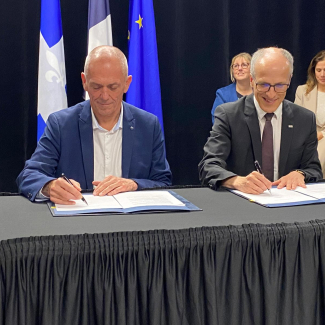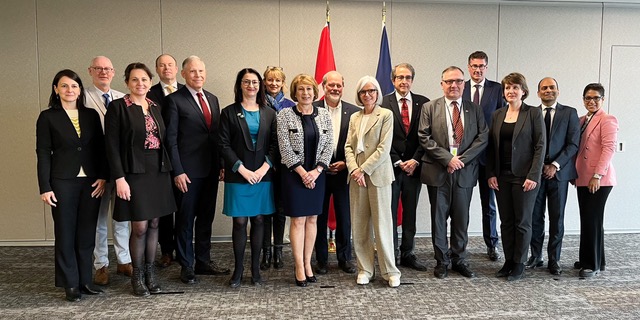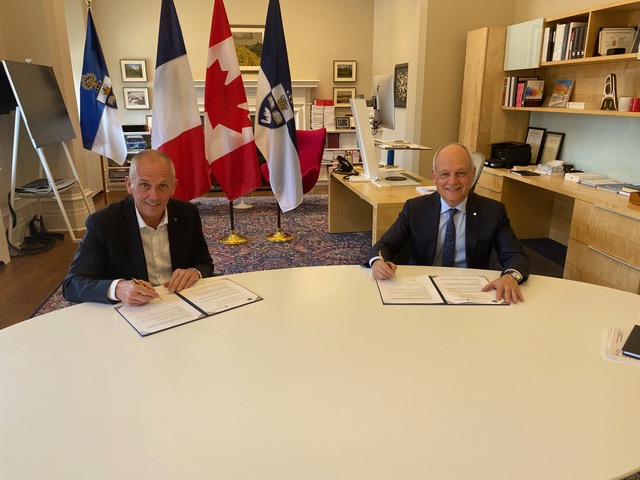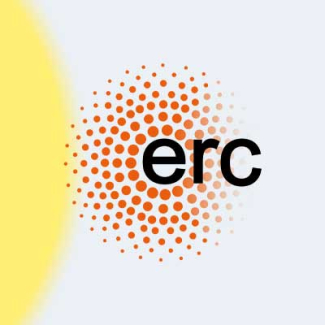
Ambitious new collaboration opportunities for the CNRS
Here, Jan Matas, the director of the CNRS's Canadian Office in Ottawa, outlines the main research partnerships between Canada and France.
The CNRS Office in Canada officially opened in January 2022. Could you give us an assessment of the first results of its work?
Jan Matas[i] : The Office was set up with a clear objective - to construct diverse new partnerships across Canada based on the existing links between scientific communities. The idea was to target national research and innovation strategies that are often complementary on both sides of the Atlantic. . In the last 18 months, we have taken a wide range of highly structuring actions. We particularly make sure to work as much as possible within a national dynamic involving French universities and other research organisations which was reflected in the creation of the Canada France Quantum Alliance (CAFQA). This is an international research network (IRN) in quantum physics made up of 8 French and 8 Canadian universities as well as the CNRS. Other initiatives include structuring strategic partnerships with the University of Toronto and the Université de Sherbrooke and the CNRS's involvement in preparatory work for the first France-Canada Canada Joint Committee on Science, Technology and Innovation (COMIX). The Office in Ottawa also supported ihe inauguration of two new international laboratories (IRLs) in Montreal and Sherbrooke, the creation of three new international research projects (IRP) in photonics, anthropocene urbanism and chemistry based in Ottawa and Calgary and also the launch of an innovative project to create a Franco-Quebec research chair on contemporary freedom of expression issues. Antoine Petit, the CNRS Chairman and CEO, has signed two framework agreements with the Natural Sciences and Engineering Research Council of Canada (NSERC) and Québec's Nature and Technologies Research Fund (FRQNT) to provide further support for high-level scientific cooperation initiatives. The Office was also reinforced in April of this year by the recruitment of a scientific project leader to further support and develop the CNRS's constructive approach in Canada.
How do these projects fit in with the CNRS's international strategy?
J. M. : The creation of the CAFQA network is in response to several of the CNRS's international strategic priorities. The network's aim is to bring together existing high-level scientific collaboration projects between France and Canada and implement complementary national quantum plans to expand and take these projects further. It also capitalises on the dynamic created by a 2021 virtual round table jointly organised by the Mitacs[1] agency and the Canadian and French embassies and involving many CNRS researchers. Finally, sixteen French and Canadian universities were involved from the outset in discussions led by the CNRS's Office in Canada working towards the construction of this unique research network. Also a first scientific conference (French link), took place in May at the CNRS's Paris and successfully confirmed the momentum of this dynamic. Around a hundred researchers took part with over forty participants from the Canadian provinces of Quebec, Ontario, Alberta and British Columbia.
The CNRS's partnership with the University of Toronto is highly important and involves all ten CNRS Institutes. It currently produces around 400 scientific joint publications each year and is linked to a dozen French universities through the 15 doctoral projects the CNRS has funded since 2019. Since 2016, the CNRS has invested around €2M to support various cooperation projects and in 2022 launched the innovative and complementary 'Twin Research Scholars', call for projects which led to the emergence of three new joint research teams in the fields of the philosophy of science, quantum communication and brain biophysics. This year the CNRS and the University of Toronto also signed a letter of intent to set up an International Research Centre (French link) (IRC).
The CNRS has developed a strong partnership for over 15 years with the Université de Sherbrooke in the fields of nanoscience, nanotechnology and quantum science. The collaborative projects this entails are part of a research ecosystem with close links to industry. This collaboration includes a large number of PhD students who are jointly supervised with several French universities and Grandes Ecoles and also involves our subsidiary CNRS Innovation. The partnership will lead to an international research centre being set up in the near future. This centre could well become an example of innovation in step with scientific excellence research working in a French-speaking context that also associates Europe and North America.
The CNRS's extensive cooperation network and institutional representation in Canada mean the organisation has a firm basis to work from within the French-Canadian partnerships ecosystem. This also led to the CNRS Chairman and CEO being invited to be part of the France-Canada Joint Committee's Strategic Council. The various federative projects the CNRS supports helped illustrate the strong potential for collaboration between the two countries at the Joint Committee's first meeting on April 24th in Ottawa. This meeting was attended by Sylvie Retailleau, the French Minister of Higher Education and Research, and François-Philippe Champagne, Canada's Minister of Innovation, Science and Industry.

What are Canada's current major research priorities? Does the country have any equivalents to the major national programmes the CNRS steers or co-steers in France like the Priority Research Programmes and Equipments (PEPR) set out in the France 2030 plan [2] ?
J. M.: The France-Canada Joint Committee has declared its aim of strengthening cooperation in the fields of emerging technologies, global health, the energy transition and ocean and polar sciences. These four sectors are in line with the drive to find solutions to major global challenges. They are present in several French PEPRs and are in step with the strategic directions for Canadian research reflected in a number of research budgets, particularly the 2021 budget which placed the emphasis on quantum research, health and bio-innovation, decarbonisation technologies and preparing for pandemics. There is no actual Canadian equivalent to France's PEPRs currently but in April 2023 the Canadian government announced its new $1.4 billion investment over 7 years in eleven 'APOGÉE'[3] projects led by several university consortia.
How do you see the future of scientific collaboration between the two countries?
J. M.: The COMIX highlighted the importance of several priority research themes and also gave a new impetus to cooperation between Canada and France by including the transversal theme of open science, science in French and multilingualism. The CNRS is already strongly involved in the field of emerging technologies. This involvement is firstly reflected by the International Laboratory on Learning Systems (ILLS) in Montreal which I hope will be able to develop links with other AI centres in Canada, specifically in Toronto / Waterloo and Edmonton. The CNRS also drives the CAFQA network and will continue to reinforce this work particularly through a second scientific conference to be held in May 2024 in Ottawa. Also, the scientific teams involved in this area can respond to the joint call for proposals run by the French National Research Agency (ANR) and the Natural Sciences and Engineering Research Council of Canada (NSERC). This call will be launched shortly and resulted from discussions within the COMIX.
Among the three other sectors proposed, ocean and polar sciences, along with the oceans and climate nexus, represent a particularly important opportunity for the CNRS. The organisation is a major stakeholder in the field, co-steering the Oceans and Climate priority research programme (PPR) with the French Research Institute for Exploitation of the Sea (IFREMER) and taking part in six other similar PPRs. With its university and institutional partners the CNRS is currently developing and supporting several joint projects in Canada located between the Atlantic, Pacific and Arctic oceans. The flagship project in this area is the international TAKUVIK laboratory labot at Laval University which also involves collaborations with Sorbonne University, the University of Western Brittany and the IFREMER. Several new Canadian investments in ocean and Arctic research including several 'APOGÉE 2023' projects represent new opportunities for ambitious cooperation between the two countries.
Of course, we will continue to support collaborations between French researchers who have created innovative scientific links with their Canadian counterparts to create new cooperation tools. In particular, in 2024 the Office will finalise the structuring of two international research centres to be jointly managed with the University of Toronto and the Université de Sherbrooke. This will involve the organisation of various activities such as scientific conferences on the priority themes identified by the steering committees involved.
It is important to stress that the CNRS will consult other French scientific, academic and institutional stakeholders to move forward with all these activities. International research collaboration clearly also benefits greatly from the preferably reciprocal mobility of talented young researchers. The systematic involvement of universities in partnerships the CNRS supports is positive for their scientific impact and also their sustainability over time.

[i] Jan Matas is director of the CNRS office in Ottawa.
[1] Mitacs is a Canadian non-profit-making organisation that has supported research and training programmes in Canada for the last 20 years. It works in collaboration with 70 Canadian universities, 6000 companies and the Government.
[2] The 'France 2030' plan with its budget of €30 billion over 5 years aims to develop industrial competitiveness and the technologies of the future.
[3] The Canada First Research Excellence Fund (the Apogee Fund) aims to build on the existing strengths of Canadian post-secondary education institutions to help them distinguish themselves internationally in areas of research that can generate social and economic benefits for Canada on a long-term basis. Through its highly competitive peer review process, the Apogee Fund invests around $200 million every year to help Canadian post-secondary institutions transform their core strengths into world-class skillsets.


